Ocelot- 流量限制服务质量
Posted markjiang7m2
tags:
篇首语:本文由小常识网(cha138.com)小编为大家整理,主要介绍了Ocelot- 流量限制服务质量相关的知识,希望对你有一定的参考价值。
Ocelot(五)- 流量限制、服务质量
作者:markjiang7m2
原文地址:https://www.cnblogs.com/markjiang7m2/p/10965300.html
源码地址:https://gitee.com/Sevenm2/OcelotDemo
本文是我关于Ocelot系列文章的第五篇,流量限制、服务质量。Ocelot允许针对具体的服务接口进行流量限制,以便下游服务不会过载而影响响应速度。服务质量则是Ocelot根据下游服务响应的结果做出判断,当超过一定次数的响应失败时,Ocelot认为该服务不可用,自动产生熔断,在一定的时间范围内不再向该服务转发请求,同时Ocelot也支持自定义的请求超时时间,当下游响应超过设定的时间,会认为该服务响应失败。
关于更多的Ocelot功能介绍,可以查看我的系列文章
本文中涉及案例的完整代码都可以从我的代码仓库进行下载。
案例六 流量限制
Ocelot支持流量限制,只要在路由中添加RateLimitOptions配置即可
"RateLimitOptions":
"ClientWhiteList": [
"markadmin"
],
"EnableRateLimiting": true,
"Period": "1m",
"PeriodTimespan": 30,
"Limit": 5
- ClientWhiteList:数组,在请求头中包含ClientId=xxx的请求不受限流控制,其中ClientId这个key可以修改,xxx表示配置的白名单。
- EnableRateLimiting:是否启用限流
- Period:限流控制的时间周期,输入单位支持s(秒), m(分), h(时), d(天)
- PeriodTimespan:恢复等待时间,当访问超过限流限制的次数后,需要等待的时间,单位为s,如当一分钟内访问超过5次,就需要等待30秒后,访问才会重新有效
- Limit:一个时间周期内允许访问的最大次数。
下面来看案例,在ReRoutes中添加一组路由
"DownstreamPathTemplate": "/api/ocelot/postId",
"DownstreamScheme": "http",
"DownstreamHostAndPorts": [
"Host": "localhost",
"Port": 8001
],
"UpstreamPathTemplate": "/ocelot/ratelimit/postId",
"UpstreamHttpMethod": [ "Get" ],
"Priority": 2,
"RateLimitOptions":
"ClientWhiteList": [
"markadmin"
],
"EnableRateLimiting": true,
"Period": "1m",
"PeriodTimespan": 30,
"Limit": 5
在这里我只是添加多了一组路由,但下游服务接口是重用了之前使用过的接口,流量限制部分配置上面已经介绍过了。下面运行来看结果。
当我第一次访问http://localhost:4727/ocelot/ratelimit/5的时候,得到了正常的返回结果
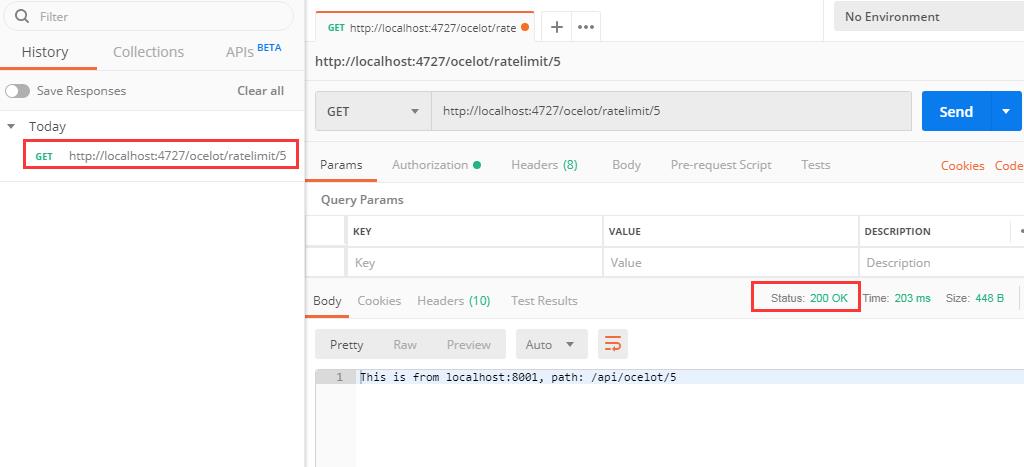
而且,在请求头可以看到流量限制的相关信息
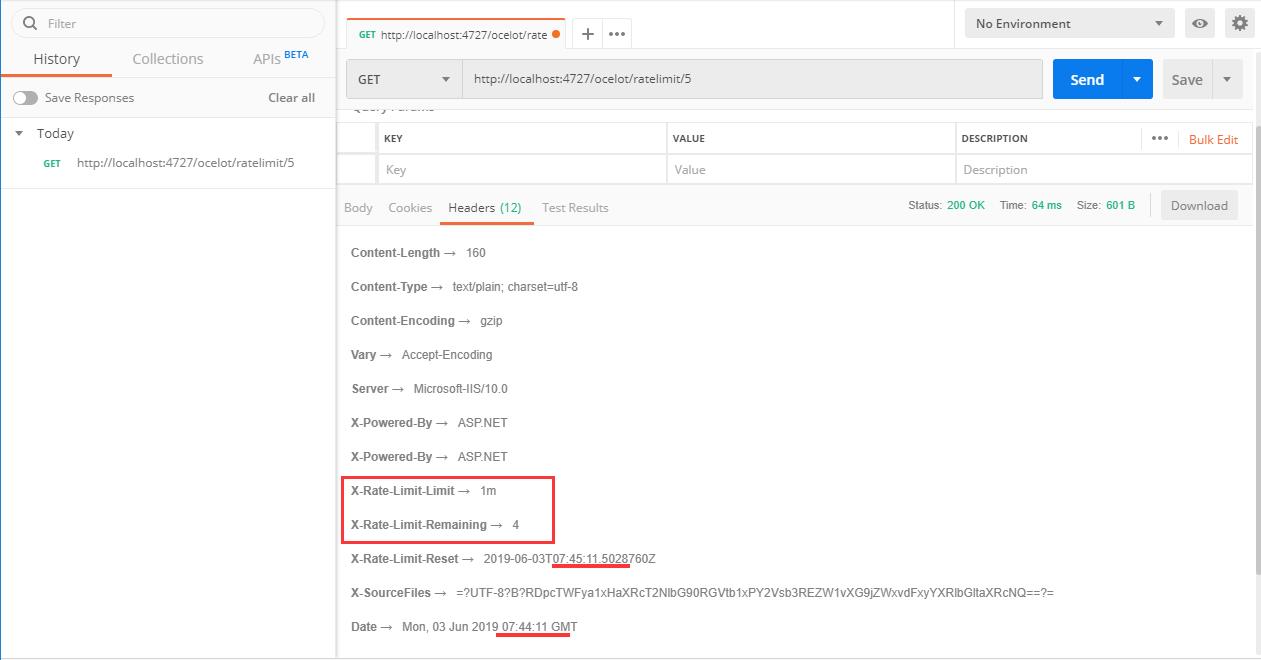
然后,我又很快地继续发出请求,可以看到,当我第六次发出请求的时候,得到了429 To Many Requests的状态
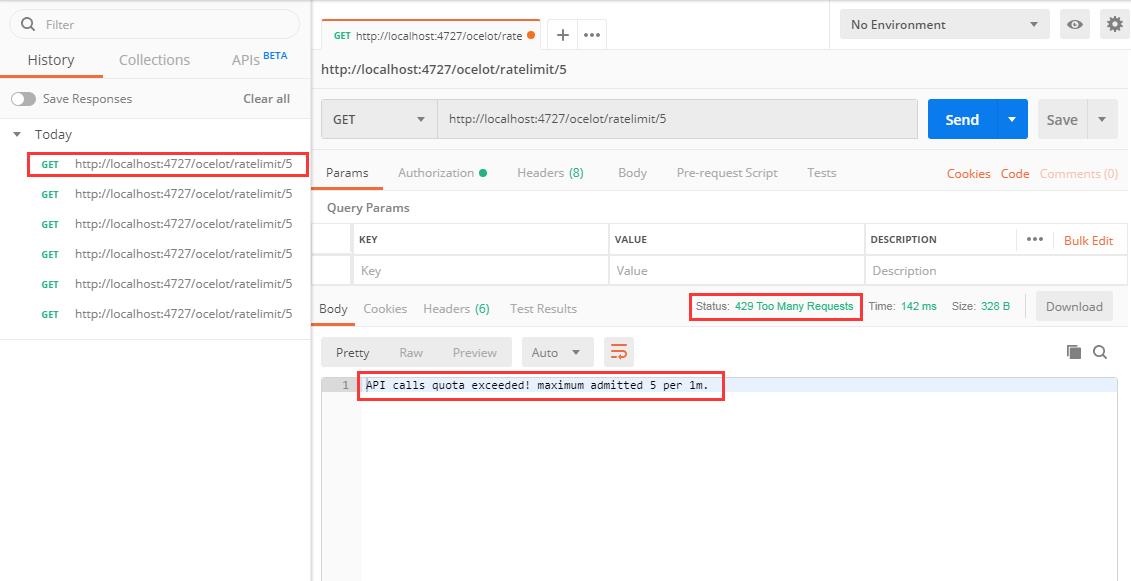
而此时的请求头信息也会不一样,这里可以看到Retry-After →28,意思是在28秒后可以恢复请求
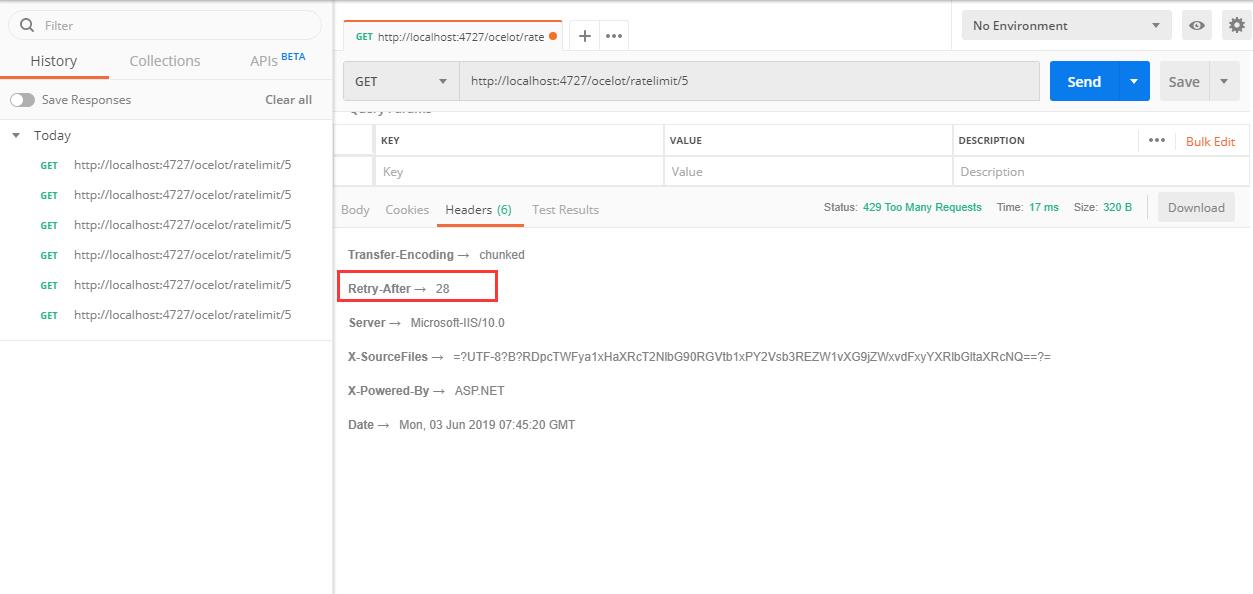
这证明,我们的Ocelot网关流量限制的作用起效了,而且与我们的配置一致。
在等待30秒之后,我重新发出请求,又得到了正常的返回结果
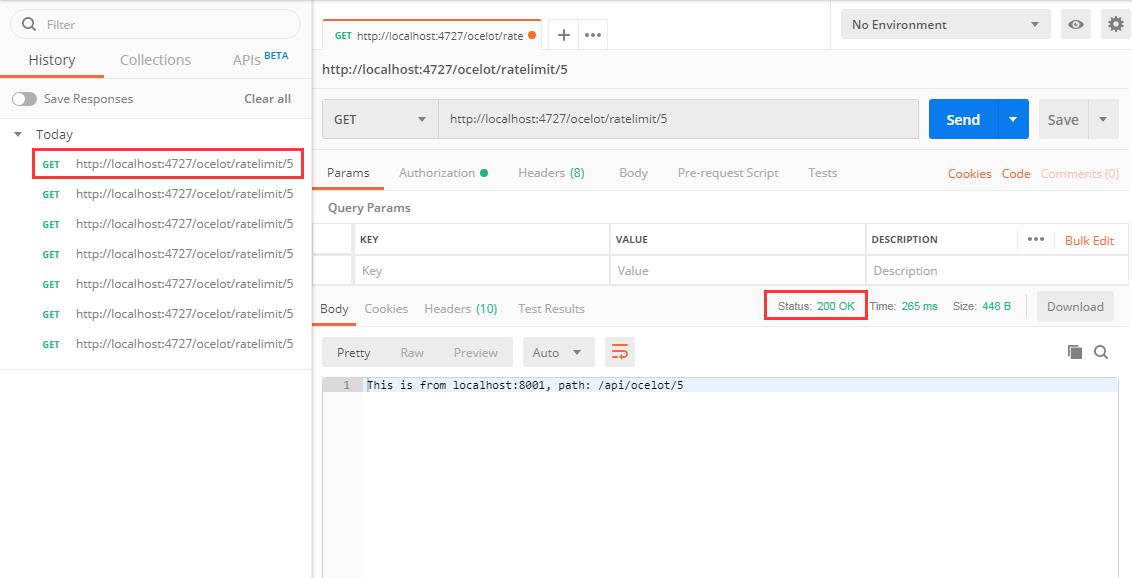
当我在请求头中加上[ClientId]=markadmin后,清空Postman的请求记录,重新开始发出请求,无论请求多少次,Ocelot也不会对我的访问进行限流
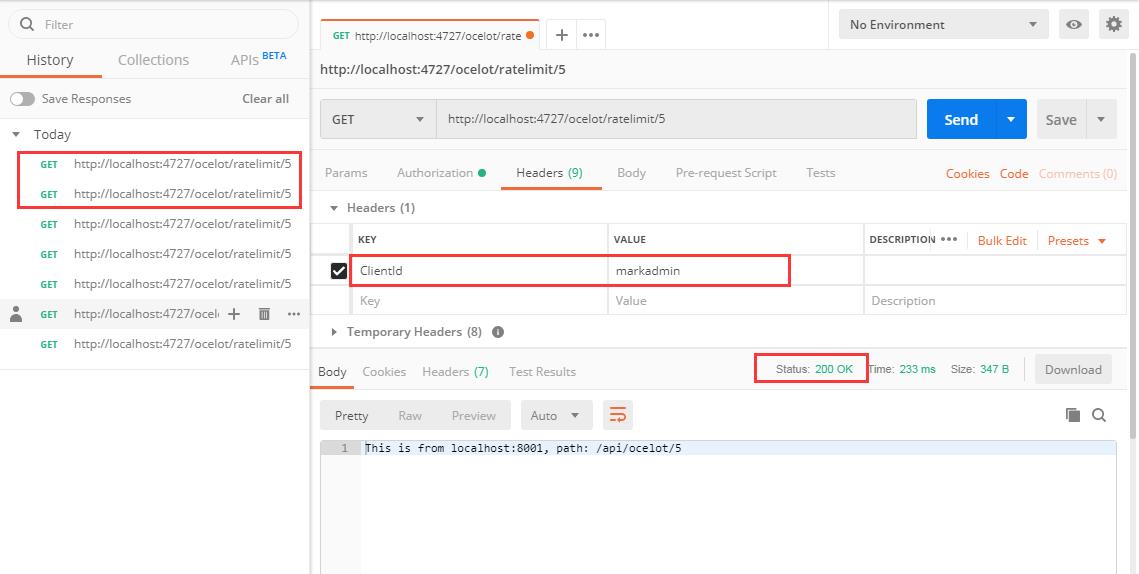
这里对于PeriodTimespan(恢复等待时间)的算法,我倒是有点疑问的。我一开始的理解是,基于上面案例的配置,当一分钟内访问超过5次时,就需要等待
Period+PeriodTimespan,也就是从第一个有效请求开始算起,一分半钟之后Ocelot才会重新正常转发请求,但是我做了几次重复实验,得到的结果都是:当一分钟内访问到第1次时,Ocelot开始进入PeriodTimespan时间内的倒计时,也就是实际的重置时间为PeriodTimespan。
为了更加明确地验证这个问题,我使用OcelotConsole项目进行测试。
首先,修改路由配置如下:
"DownstreamPathTemplate": "/api/ocelot/postId",
"DownstreamScheme": "http",
"DownstreamHostAndPorts": [
"Host": "localhost",
"Port": 8001
],
"UpstreamPathTemplate": "/ocelot/ratelimit/postId",
"UpstreamHttpMethod": [ "Get" ],
"Priority": 2,
"RateLimitOptions":
"ClientWhiteList": [
"markadmin"
],
"EnableRateLimiting": true,
"Period": "1m",
"PeriodTimespan": 10,
"Limit": 5
然后,在OcelotConsole项目中添加代码如下:
public static async Task Main(string[] args)
using (var client = new HttpClient())
for (var i = 0; i < 100; i++)
Console.WriteLine(DateTime.Now);
var result = await client.GetAsync("http://localhost:4727/ocelot/ratelimit/5");
Console.WriteLine($"result.StatusCode, result.Content.ReadAsStringAsync().Result");
System.Threading.Thread.Sleep(1000);
Console.Read();
每隔1s就发出一次请求,运行,在命令窗口得到以下输出:
2019/6/3 13:33:31
OK, This is from localhost:8001, path: /api/ocelot/5
2019/6/3 13:33:32
OK, This is from localhost:8001, path: /api/ocelot/5
2019/6/3 13:33:33
OK, This is from localhost:8001, path: /api/ocelot/5
2019/6/3 13:33:34
OK, This is from localhost:8001, path: /api/ocelot/5
2019/6/3 13:33:35
OK, This is from localhost:8001, path: /api/ocelot/5
2019/6/3 13:33:36
TooManyRequests, API calls quota exceeded! maximum admitted 5 per 1m.
2019/6/3 13:33:37
TooManyRequests, API calls quota exceeded! maximum admitted 5 per 1m.
2019/6/3 13:33:38
TooManyRequests, API calls quota exceeded! maximum admitted 5 per 1m.
2019/6/3 13:33:39
TooManyRequests, API calls quota exceeded! maximum admitted 5 per 1m.
2019/6/3 13:33:40
TooManyRequests, API calls quota exceeded! maximum admitted 5 per 1m.
2019/6/3 13:33:41
OK, This is from localhost:8001, path: /api/ocelot/5
2019/6/3 13:33:43
OK, This is from localhost:8001, path: /api/ocelot/5
2019/6/3 13:33:44
OK, This is from localhost:8001, path: /api/ocelot/5
2019/6/3 13:33:45
OK, This is from localhost:8001, path: /api/ocelot/5
2019/6/3 13:33:46
OK, This is from localhost:8001, path: /api/ocelot/5
2019/6/3 13:33:47
TooManyRequests, API calls quota exceeded! maximum admitted 5 per 1m.
2019/6/3 13:33:48
TooManyRequests, API calls quota exceeded! maximum admitted 5 per 1m.
2019/6/3 13:33:49
TooManyRequests, API calls quota exceeded! maximum admitted 5 per 1m.
2019/6/3 13:33:50
TooManyRequests, API calls quota exceeded! maximum admitted 5 per 1m.
2019/6/3 13:33:51
TooManyRequests, API calls quota exceeded! maximum admitted 5 per 1m.然后,我又通过修改参数,得出如下结果:
- PeriodTimespan=10, Limit=5:5个成功,5个失败
- PeriodTimespan=10, Limit=6:6个成功,4个失败
- PeriodTimespan=20, Limit=5:5个成功,15个失败
- PeriodTimespan=30, Limit=5:5个成功,25个失败
似乎都是与我前面得到的结论相同,与官方文档不一致。
我在GitHub上提了一个issue:https://github.com/ThreeMammals/Ocelot/issues/910,期待能得到答复。
流量限制的全局配置
"RateLimitOptions":
"DisableRateLimitHeaders": true,
"QuotaExceededMessage": "Customize Tips!",
"HttpStatusCode": 999,
"ClientIdHeader": "Test"
- DisableRateLimitHeaders:当设为true时,请求头中就不会输出流量限制的相关信息,默认值:"false"
- QuotaExceededMessage:当请求数量超出流量限制时,输出的信息,默认值:"API calls quota exceeded! maximum admitted
LimitperPeriod."
- HttpStatusCode:当请求数量超出流量限制时,输出的状态码,默认值:"429"
- ClientIdHeader:标识为白名单中的客户端的请求头key,默认值:"ClientId"
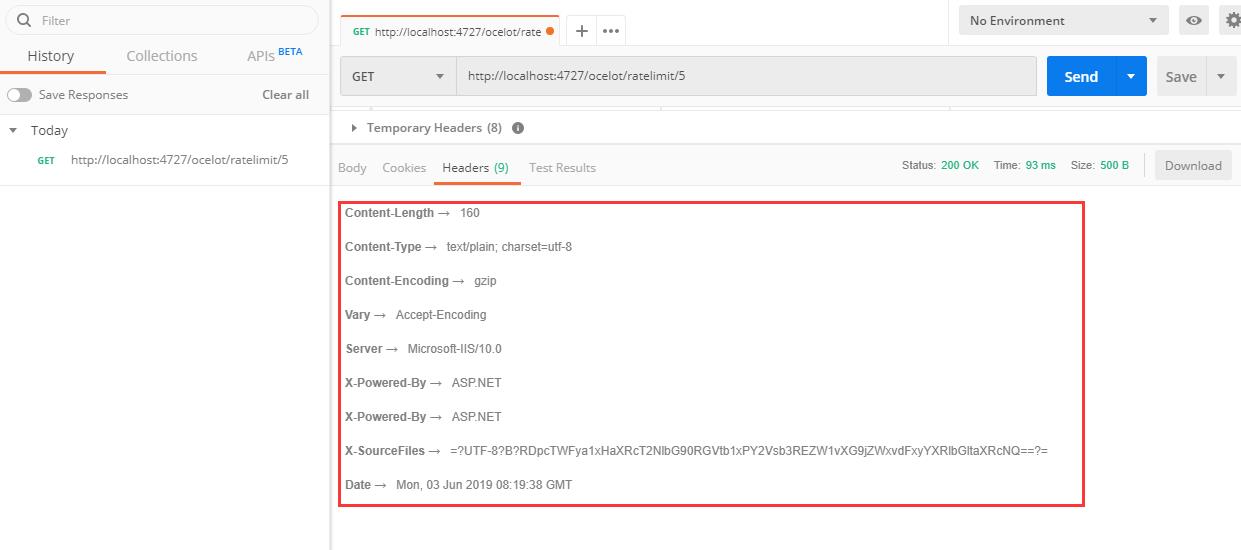
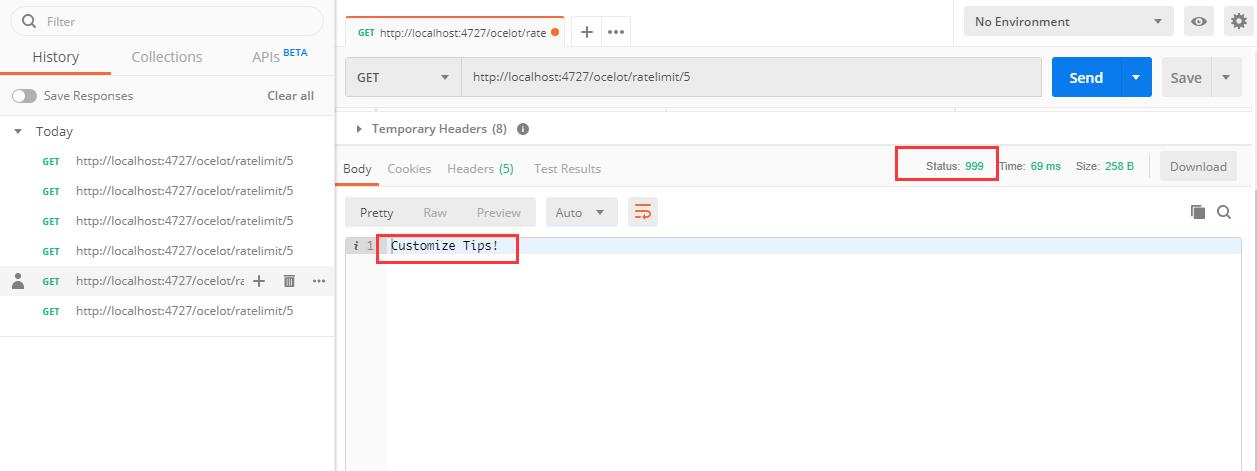
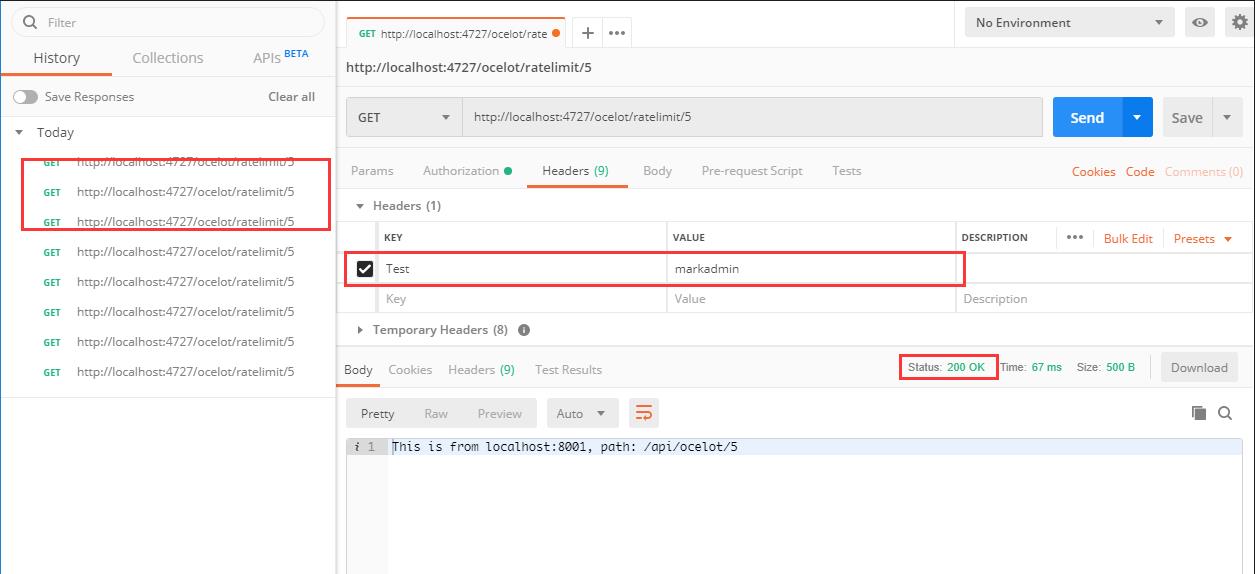
案例七 服务质量
Ocelot支持服务质量与熔断,意味着当下游服务不可用时,Ocelot会进行自动熔断,不再将请求转发给该下游服务。来看看配置
"QoSOptions":
"ExceptionsAllowedBeforeBreaking":3,
"DurationOfBreak":3000,
"TimeoutValue":5000
- ExceptionsAllowedBeforeBreaking:允许异常次数,当Ocelot转发给该下游服务连续出现异常次数达到该数字时,Ocelot会进行自动熔断,一段时间内不再向该下游服务转发请求
- DurationOfBreak:熔断时间,单位为ms(毫秒),持续多长时间不向该下游服务转发请求
- TimeoutValue:服务质量配置项,超时时间,单位为ms(毫秒),当Ocelot向下游服务转发请求多长时间后,自动认为该请求超时
ExceptionsAllowedBeforeBreaking 必须跟 DurationOfBreak一起使用,TimeoutValue可以单独使用。
首先需要安装Polly支持程序,通过Nuget搜索Ocelot.Provider.Polly或者通过以下命令安装
Install-Package Ocelot.Provider.Polly然后在Startup.cs中的ConfigureServices方法注册该中间件
using Ocelot.Provider.Polly;public void ConfigureServices(IServiceCollection services)
……
services.AddOcelot()
.AddPolly();
……
在ReRoutes中添加一组路由
"DownstreamPathTemplate": "/api/ocelot/postId",
"DownstreamScheme": "http",
"DownstreamHostAndPorts": [
"Host": "localhost",
"Port": 8001
],
"UpstreamPathTemplate": "/ocelot/qos/postId",
"UpstreamHttpMethod": [ "Get" ],
"Priority": 2,
"QoSOptions":
"ExceptionsAllowedBeforeBreaking": 3,
"DurationOfBreak": 3000,
"TimeoutValue": 5000
为了看出熔断效果,我将8001端口的下游服务停止了,然后运行OcelotDemo项目
当第一次向网关发出请求时,得到500的状态码
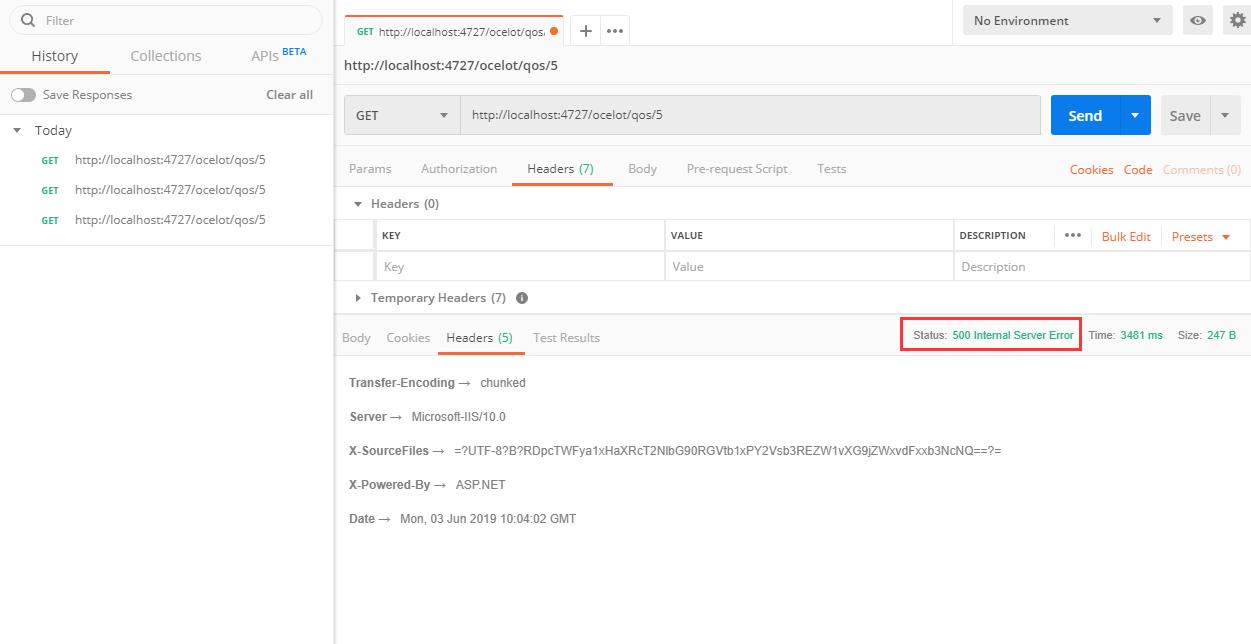
连续3次请求过后,就会得到503的状态码,证明Ocelot已经产生熔断
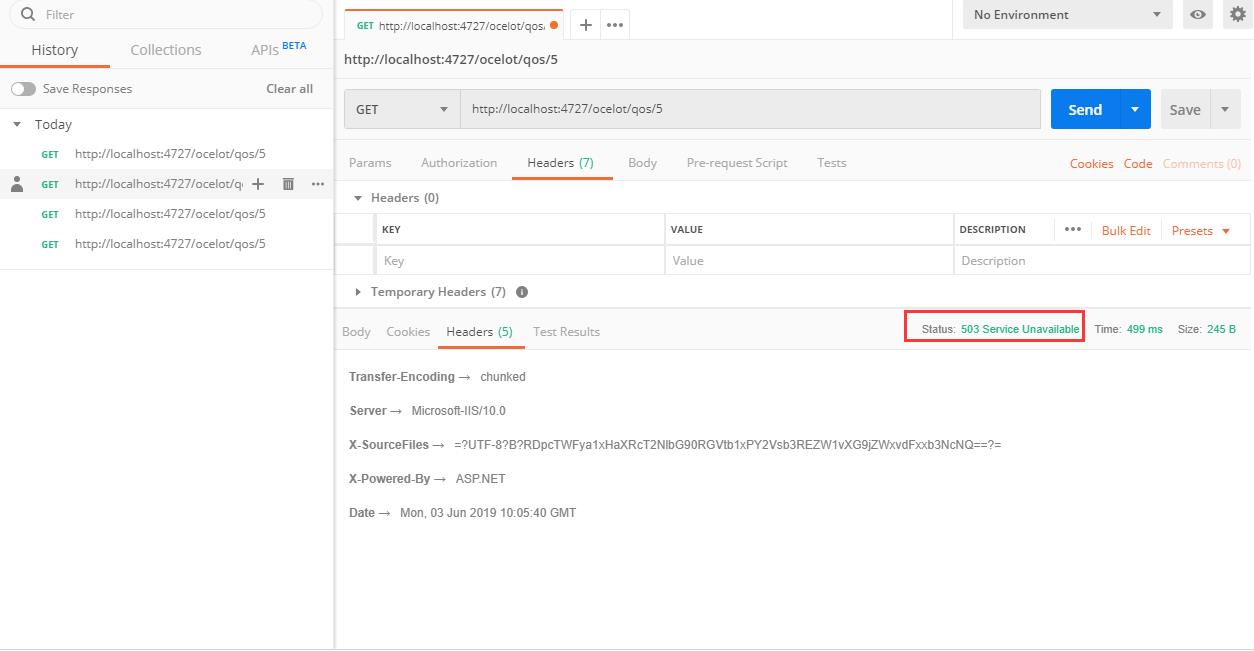
总结
在这篇文章中就跟大家介绍了Ocelot的两个基础功能,在路由中进行配置即可使用,不需要依赖于第三方的服务。当然在我实践的过程中产生的一个疑问暂时还没得到答案,如果有知道原因的朋友也可以给我留言,感激不尽。
结合前面的几篇文章,大家在设计项目API网关的时候就可以综合地考虑到底哪些功能应该配置使用,如何适当地建立路由表。例外,我在这几个案例中为了突出要介绍的功能,基本上都是一组路由单独配置一个功能,而在实际项目中通常都是需要在一组路由当中同时配置多个功能的,希望大家在实际项目中能够灵活运用。今天就先跟大家介绍到这里,希望大家能持续关注我们。
以上是关于Ocelot- 流量限制服务质量的主要内容,如果未能解决你的问题,请参考以下文章